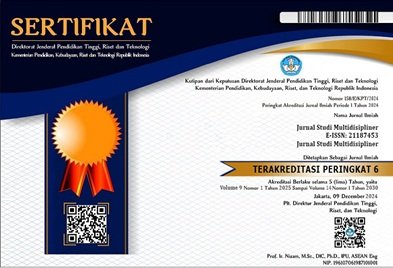IMPLEMENTASI PENGGUNAAN MODEL PEMBELAJARAN BERBASIS PROYEK DALAM KURIKULUM MERDEKA PADA MATA PELAJARAN IPAS DI SDN 3 PAKSEBALI KABUPATEN KLUNGKUNG
Kata Kunci:
Implementasi, Model Pembelajaran Berbasis Proyek, Kurikulum Merdekka, Pelajaran IPASAbstrak
Pendidikan didefinisikan dalam Undang-Undang Nomor 20 Tahun 2003 tentang Sistem Pendidikan Nasional merupakan sebuah usaha yang dilakukan secara sengaja dan terstruktur untuk menciptakan suasana pembelajaran serta proses pembelajaran untuk mengembangkan potensi mereka. Namun proses pembelajaran yang tidak kreatif dapat membuat siswa merasa bosan dan kurang bersemangat. Menghadapi tantangan ini, diperlukan penerapan metode pembelajaran yang lebih beragam dan inovatif, salah satunya adalah model Pembelajaran Berbasis Proyek (PJBL) adalah salah satu dari banyak pendekatan pembelajaran yang lebih canggih dan beragam. Rumusan masalah yang dibahas dalam penelitian ini yaitu : 1) Bagaimana strategi guru dalam menerapkan model pembelajaran berbasis proyek pada mata pelajaran IPAS di SD N 3 Paksebali?, 2) Bagaimana implikasi pelaksanaan model pembelajaran berbasis proyek terhadap hasil belajar siswa pada mata pelajaran IPAS di SD N 3 Paksebali?.Secara umum tujuan penelitian ini untuk mengetahui implementasi pengunaan model pembelajaran berbasis proyek dalam pembelajaran IPAS pada siswa kelas V di SD Negeri 3 Paksebali. Penelitian ini dilakukan di kelas V SDN 3 Paksebali. Teori yang digunakan dalam menganalisis rumusan masalah adalah Teori Behavioristik (Thorndike) dan Teori Konstruktivisme (Jean Piaget & Lev Vygotsky). Metode pengumpulan data menggunakan metode Observasi, Wawancara, studi Kepustakaan, studi Dokumentasi. Data yang telah terkumpul dianalisis data dengan metode pengumpulan data, Reduksi data, Penyajian data, penarikan Simpulan dan verifikasi. Hasil penelitian menunjukkan 1) Strategi guru yang digunakan dalam menerapkan model pembelajaran berbasis proyek pada mata pelajaran IPAS yaitu yang pertama ada Tahap perencanaan, Tahap pelaksanaan, Tahap evaluasi dan Refleksi. 2) Implikasi pelaksanaan model pembelajaran berbasis proyek terhadap hasil belajar siswa pada mata pelajaran IPAS kelas V SDN 3 Paksebali meliputi : Implikasi terhadap sikap belajar siswa dan Implikasi terhadap hasil belajar siswa. Dari implikasi tersebut dapat dilihat bahwa penerapan model pembelajaran berbasis proyek berdampak positif terhadap sikap belajar siswa dan hasil belajar siswa menjadi lebih meningkat.
Education is defined in Law Number 20 of 2003 concerning the National Education System as an effort that is carried out deliberately and structured to create a learning atmosphere and learning process to develop their potential. However, a learning process that is not creative can make students feel bored and less enthusiastic. Facing this challenge, it is necessary to apply more diverse and innovative learning methods, one of which is the Project-Based Learning (PJBL) model, which is one of the many more sophisticated and diverse learning approaches. The formulation of the problem discussed in this study are: 1) What is the teacher's strategy in implementing the project-based learning model in the subject of science at SD N 3 Paksebali?, 2) What are the implications of implementing the project-based learning model on student learning outcomes in the subject of science at SD N 3 Paksebali? In general, the purpose of this study is to determine the implementation of the use of the project-based learning model in science learning for fifth grade students at SD Negeri 3 Paksebali. This research was conducted in class V of SDN 3 Paksebali. The theory used in analyzing the formulation of the problem is the Behaviorist Theory (Thorndike) and Constructivism Theory (Jean Piaget & Lev Vygotsky). The data collection method uses the Observation method, Interview, Literature study, Documentation study. The data that has been collected is analyzed using the data collection method, Data reduction, Data presentation, Conclusion drawing and verification. The results of the study show 1) The teacher's strategy used in implementing the project-based learning model in the subject of science, namely the first is the planning stage, Implementation stage, Evaluation stage and Reflection. 2) The implications of implementing a project-based learning model on student learning outcomes in the subject of science in grade V of SDN 3 Paksebali include: Implications for students' learning attitudes and Implications for students' learning outcomes. From these implications, it can be seen that the implementation of project-based learning models has a positive impact on students' learning attitudes and students' learning outcomes have increased.





